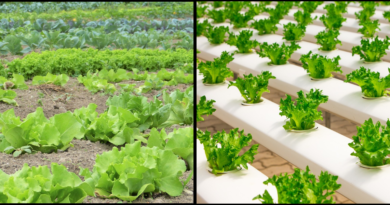Organic Farming in Urban Spaces

Introduction:
Organic farming in urban cities is gaining traction in the world’s fast-urbanizing cities as a creative and sustainable way to satisfy the rising need for wholesome, fresh vegetables. The main ideas, advantages, and methods of urban organic farming are examined in this article, which also highlights the ways in which it supports environmentally friendly and sustainable city life.
Understanding Organic Farming:
A comprehensive approach to agriculture, organic farming places a strong emphasis on cultivating crops through natural cycles and processes. Instead of utilizing artificial fertilizers and pesticides, it emphasizes the use of organic inputs, including compost, cover crops, and organic pest control techniques.
The Rise of Urban Organic Farming:
The necessity for sustainable food production inside city borders grows as urban areas get bigger. Urban organic farming lowers the carbon footprint associated with long-distance food transportation, marking a move toward local and ecologically beneficial agriculture. Mindful Consumption: Choosing Sustainable Products for a Healthier Future
Principles of Urban Organic Farming:
Natural inputs over chemicals:
Natural inputs like compost, organic matter, and cover crops are given precedence over synthetic pesticides and fertilizers in urban organic gardening. This reduces environmental impact while promoting soil health.
Rooftop Gardens for Sustainable Living:
Urban organic farming is based on the core idea of using roofs as gardens. In addition to offering fresh fruit, rooftop gardens also provide insulation, energy efficiency, and better air quality, all of which support sustainable livingHow Sustainable Practices Can Extend Your Life.
Maximizing Space with Vertical Farming:
Vertical farming is popular in urban settings because of the space constraints. This entails planting crops in layers that are stacked vertically to maximize space and raise yields without spreading outward.
Biodiversity and companion planting:
Urban organic farming, which prioritizes biodiversityhttps://en.wikipedia.org/wiki/Biodiversity, frequently uses companion planting, which is the deliberate arrangement of plants that complement one another to promote development and naturally ward off pests.
Closed-Loop Systems for Sustainability:
Urban organic farming is characterized by closed-loop systems, in which waste products from one element become inputs for another. For instance, utilizing kitchen waste to compost and produce nutrient-rich soil promotes a circular and sustainable strategy.
Community Involvement and Education:
Community engagement is essential for urban organic farming to flourish. Involving locals in seminars, educational initiatives, and community gardens promotes involvement and deepens awareness of organic agricultural methods.
Water Conservation Practices:
Urban organic farming recognizes the value of water conservation and uses techniques like rainwater collection and effective irrigation systems to reduce water use and encourage resource management.
Holistic Pest Management:
To keep the ecosystem in balance and reduce the need for chemical pesticides, urban organic farming uses holistic techniques to pest management, such as introducing beneficial insects, companion planting, and natural predators.
Regenerative Practices for Soil Health:
Cover cropping and rotational planting are two examples of regenerative strategies used to address the problems with urban soil quality. These methods improve the general health, fertility, and structure of the soil.
Energy-Efficient Practices:
Powering urban farms with renewable energy sources is one example of how sustainable energyhttps://en.wikipedia.org/wiki/Sustainable_energy practices are integrated. By doing this, the carbon footprint of producing food in the city center is decreased.
By following these guidelines, urban organic farming becomes more than just a farming technique; it also becomes a comprehensive and sustainable way to feed our people and improve the quality of the environment in urban areas.
Benefits of Urban Organic Farming:
Local Food Security:
By lowering dependency on outside sources, urban organic gardening improves local food security. Communities become more robust to outside influences that might upset the food supply chain when crops are produced inside municipal borders.
Reduced Carbon Footprint:
The carbon impact of long-distance food transportation is significantly lowered by urban organic farming’s targeted approach. Produce may be grown closer to the point of consumption, reducing transportation-related greenhouse gas emissions and promoting a more sustainable urban environment.
Community Engagement:
Urban organic farming connects people around the common objective of producing sustainable, locally sourced food, which promotes community involvement. Social ties are forged through communal gardens and growing areas, which promote collaboration and a sense of belonging.
Healthier Lifestyles:
People in cities that have access to fresh, organic vegetables tend to eat better. Urban organic farming, with its emphasis on wholesome, regional produce, helps alleviate diet-related health problems in urban areas.
Green Spaces and Aesthetics:
Urban organic farming adds aesthetic value to the urban landscape by converting roofs and barren lots into green areas. These verdant havens provide a break from the urban jungle and enhance mental health in their surroundings.
Waste Reduction and Recycling:
Composting organic waste is a common practice in urban organic farming to produce soil that is rich in nutrients. This procedure helps to create a closed-loop system in the city and lessens the quantity of organic waste that ends up in landfills.
Increased Property Values:
Property values in the area may appreciate when green areas and community gardens related to urban organic farming are present. These areas promote community involvement and visual appeal, which enhance the quality of life in the surrounding area.
Educational Opportunities:
Urban farms and community gardens offer excellent educational possibilities. Locals may get knowledge about the fundamentals of organic farming, the value of sustainable agriculture, and the advantages of eating food that is grown nearby. This is especially beneficial for young residents.
Job Creation:
Growing urban organic farming creates jobs in the surrounding areas. Jobs in a variety of industries are created by the expansion of urban agriculture, from farm management to sales and distribution.
Climate Resilience:
Urban organic farming promotes climate resilience by putting a focus on regenerative and sustainable approaches. Urban farms may become more resilient to shifting environmental circumstances by establishing healthy soil, preserving water, and using environmentally friendly farming practices.
In conclusion
Urban organic farming has several advantages outside of the agricultural sector. They create a fabric of sustainability in the center of our cities by addressing issues of economics, health, environment, and community. Embracing and developing these advantages becomes essential for building strong and prosperous urban communities as urban populations continue to rise.
Challenges and Solutions:
Limited Space:
- Difficulty: Large-scale organic farm establishment is sometimes hindered by space restrictions in urban settings.
- Solution: Use cutting-edge methods for optimizing available area, such rooftop gardens, container planting, and vertical farming. These methods make effective use of the space that is available in urban settings.
Soil Quality:
- Problem: Urban soils might be polluted or deficient in vital nutrients for healthy plant development.
- Solution: Use raised beds loaded with premium organic soil to address problems with soil quality. Additionally, cultivate vegetables without using urban soil by using soilless methods like aquaponics and hydroponics.
Community Education:
- Problem: It’s possible that a lot of city dwellers are unaware of organic agricultural methods.
- Solution: Hold seminars, workshops, and community education events to increase knowledge of the advantages of urban organic gardening. Involve community centers and schools to encourage a greater comprehension of sustainable agriculture.
Pest and Disease Management:
- Problem: It might be difficult to control illnesses and pests in urban settings without using artificial pesticides.
- Solution: Use comprehensive pest management techniques, such as crop rotation, companion planting, and the introduction of beneficial insects. By using these techniques, the ecosystem’s equilibrium is preserved, and the need for chemical pesticides is decreased.
Water Management:
- Problem: Inefficient or limited water consumption is a common issue in urban settings.
- Solution: To maximize water consumption in urban organic farming, implement water conservation techniques, including drip irrigation systems and rainwater gathering. This guarantees agricultural water management that is sustainable.
Economic Viability:
- Obstacle: For many urban farmers, organic farming may not be economically viable.
- Solution: To improve economic viability, investigate direct-to-consumer methods like farmers’ markets and community-supported agriculture (CSA). Work together with neighborhood companies and eateries to generate demand for organic produce that is farmed nearby.
Energy Consumption:
- Problem: Growing organic food in urban areas might lead to higher energy usage.
- Solution: Choose energy-efficient methods, such as powering urban farms with solar panels or other renewable energy sources. Use smart technology to minimize the impact on the environment by tracking and managing energy consumption.
Technological Accessibility:
- Challenge: Adoption of sustainable farming techniques may be limited by limited access to current farming technologies.
- Solution: Arrange seminars and training sessions to teach urban farmers how to employ technology in their farming operations. To increase the accessibility of sustainable agricultural technologies for urban people, look to form collaborations with technology suppliers.
Data Collection and Monitoring:
- Problem: Insufficient information on urban organic farming methods may make monitoring and improvement more difficult.
- Solution: Establish cooperative portals so that urban farmers may exchange data. Collaborate with organizations and research centers to carry out studies on the effects of urban organic farming, encouraging a continuous development strategy based on facts.
Cultural Acceptance:
- Challenge: Acceptance in the community may be impacted by cultural views toward urban farming.
- One potential solution may be to launch cultural awareness programs that emphasize the advantages of urban organic gardening for the environment, culture, and public health. Work together with community leaders and influencers in the area to increase awareness and respect for sustainable agriculture.
In summary,
Urban organic farming may develop into a resilient, sustainable, and generally accepted practice that promotes environmental stewardship and improves the health and well-being of urban populations by acknowledging these issues and putting smart solutions in place. Through community collaboration, innovative technologies, and a commitment to sustainability, organic farming is transforming urban spaces into thriving hubs of local, nutritious food production.
Visit at greenhealings.com for more insights into sustainable living, organic farming, and holistic well-being.




